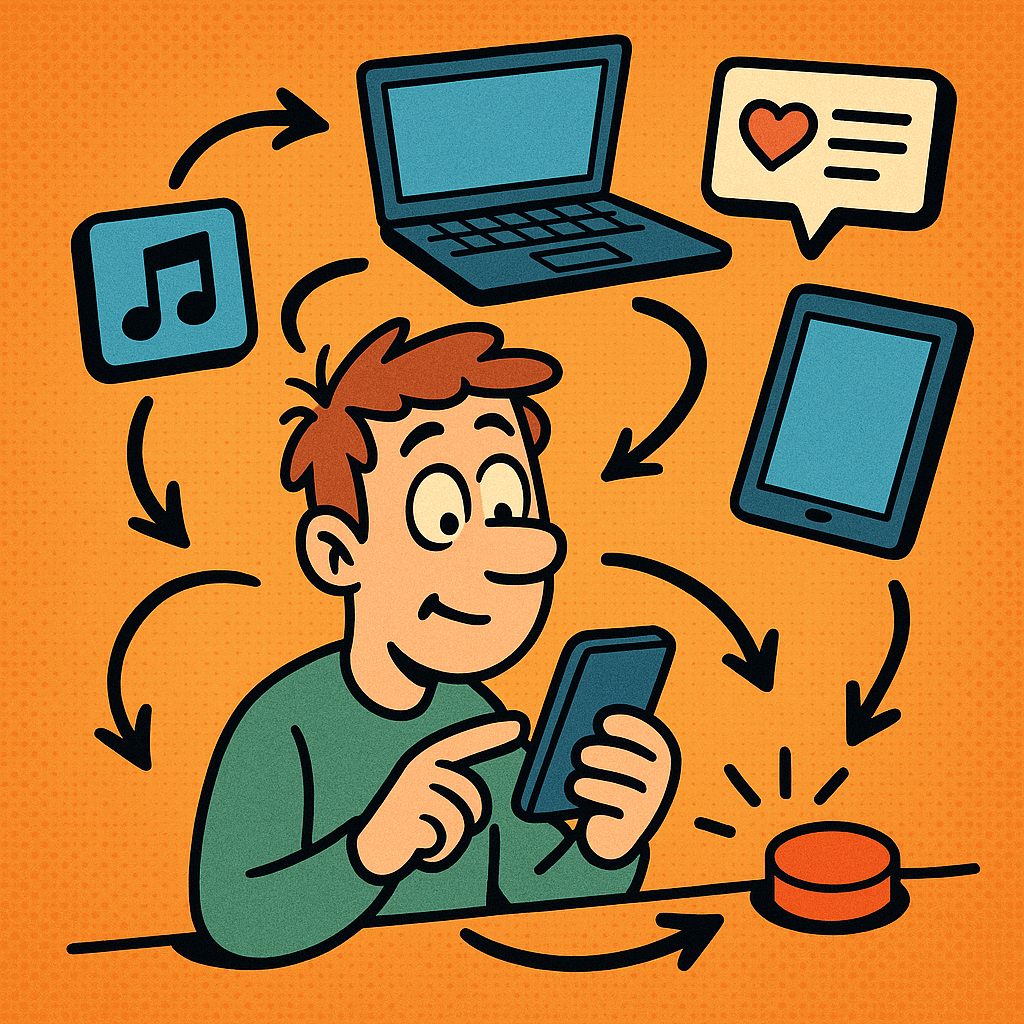Digital habits sneak into our lives—or so subtly we barely notice. Whether it’s endless scrolls, instinctive notifications pings, or checking our phones first thing, these patterns aren’t conscious choices. Let’s explore why most digital habits are accidental and what that means for our focus, mental health, and daily routines.

What Makes a Habit “Accidental”?
A habit becomes automatic when we repeat a behavior in a specific context until our brain links the two. Psychologist Wendy Wood explains that roughly 40–43% of daily actions are automatic, triggered by external cues—time, location, even emotions. In digital life, every chime, badge, and color-coded alert serves as a cue—calling us into action without conscious thought.
1. Notifications: The Accidental Habit Triggers
A constant barrage
Recent data shows mobile users can receive dozens of news alerts daily—some up to 50 push notifications a day. This “alert fatigue” not only frustrates users, it reshapes their habits. People disable notifications or even uninstall apps, but by then, the habit loop is already established: cue → check → reward.
Dopamine hits and small wins
Each notification brings a promise of novelty—a like, message, or update—triggering tiny dopamine surges. These “small wins” reinforce the behavior, making us chase the next alert automatically . Apps exploit this through micro‑reward design: badge icons, streaks, and pop-ups—gamified triggers that latch onto subconscious reward circuits.
2. Digital Habit Loops: Cue, Behavior, Reward
A classic model breaks habits into four parts: context cue, craving, action, reward:
- Cue – a ping, badge icon, or idle notification.
- Craving – the urge to check, often born from fear of missing out (FOMO).
- Action – unlocking the phone, tapping the notification.
- Reward – dopamine hit from novel content.
These loops are powerful because they sidestep our intentions. We may plan to disconnect—but without conscious interruption, the cue overrides our intention, and habits slip in.
3. Design That Reinforces Unconscious Behavior
Persuasive UX
Research shows persuasive features in apps—like infinite scroll, variable reward schedules, reminders—intensify habitual use . Social media platforms, streaming services, and news apps all use “attention hooks” that leverage our reward systems to keep us engaged—often without intention.
Context‑aware nudges
Tools like ContextSDK detect user behavior and send notifications timed to habitual moments—after lunch, during downtime—making engagement feel “natural,” but it’s actually pre-programmed. This personalization further embeds digital habits into our daily routines.
4. The Hidden Consequences of Accidental Habits
Reduced focus & alert fatigue
Studies show every notification causes a 60–90 second focus reset. With 50 pings per day, that’s over an hour of fragmented attention—without noticing it.
Mental fatigue & stress
Constant context-switching causes mental strain, errors, and stress. It’s no wonder people end the day exhausted, not because of exertion, but constant digital interruption.
Social disconnect
What happens when we choose notifications over real conversation? A growing body of evidence warns of “phubbing”—phone snubbing—a silent erosion of in-person connections and trust. These habits are changing our social dynamic, often without us recognizing the shift.
5. Emerging Trend: Context‑Driven Automatic Notifications
A hot emerging trend: context‑aware, predictive notifications. Instead of static alerts, apps now analyze your habits and environment to trigger just‑in‑time cues (e.g. “Check this now!” after a break). This strategy dramatically increases engagement—60% higher for apps that use it—but also makes digital habits more unconscious than ever before.
6. How to Reclaim Intentional Control
1. Audit your alerts
Record which apps ping you daily. Disable all non-essential notifications—especially news, social, and game alerts.
2. Schedule “digital check‑ins”
Instead of reacting to every cue, set fixed times to check emails, messages, social feeds (e.g. morning, early afternoon, evening).
3. Introduce friction
Add slight delays: require extra taps to access apps, set grayed-out display, or use “focus mode.” These small tweaks interrupt the habit loop.
4. Mindful habit replacement
Replace accidental habits with intentional ones—for instance, checking messages only while having a coffee. Keep cues similar, but rewire behavior.
5. Use technology to your advantage
Behavior-change apps (like HabitLab) or device settings (Do Not Disturb, grayscale mode) help reduce accidental triggers and support better habits.
7. The Road Forward
As technology evolves, digital habits won’t slow down—they’ll become more subtle and personalized. But awareness is our best defense. Recognizing that most digital habits are accidental helps us take back intentional control.
Who stands to win? Users who take proactive steps—curate alerts, add friction, and replace digital cues with intentional actions. The result: regained attention, clarity, and deeper real-world connections.
Key Takeaways
- Most digital habits form unconsciously, driven by cues, dopamine loops, and app design.
- Notification overload creates hidden cost—lost focus, stress, and fragmented attention.
- Context-aware apps accelerate habit formation by preying on our environment.
- Solutions are simple, practical, and rooted in awareness: audit, schedule, add friction.
By understanding how most digital habits are accidental, we gain the tools to shape our digital lives on purpose—not by default.
Sources
- Sparrow, B., Liu, J., & Wegner, D. M. (2011). Google Effects on Memory: Cognitive Consequences of Having Information at Our Fingertips. Science. Retrieved from https://en.wikipedia.org/wiki/Google_effect en.wikipedia.org
- Stokel‑Walker, C. (2025, June 9). Why your phone habits leave you feeling so bad. Fast Company. Retrieved from https://www.fastcompany.com/91348032/why-your-phone-habits-leave-you-feeling-so-bad fastcompany.com
- “Digital distraction and its impact on your health.” (2023, September 27). Mass General News. Retrieved from https://www.massgeneral.org/news/article/digital-distraction-and-its-impact-on-your-health massgeneral.org






